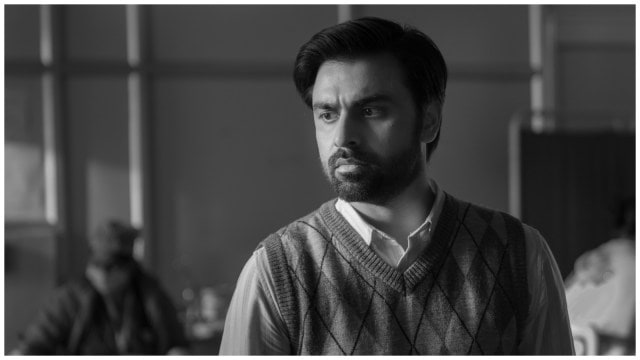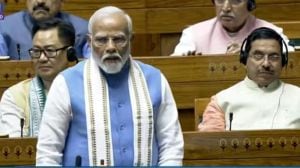- India
- International
Kota Factory season 3 review: Jeetu Bhaiya enters his Soft Boy Era as Netflix show finally gets passing marks after three attempts
Kota Factory season 3 review: Straightforward to a fault, the third season of Netflix's coming-of-age drama appears to evolve along with its characters, while tapping into Jitendra Kumar's potential as a dramatic actor.
 Jitendra Kumar in a still from Kota Factory.
Jitendra Kumar in a still from Kota Factory. You could throw a literal kitchen sink at Jeetu Bhaiya in the first two seasons of Kota Factory and he would come out unharmed. There was simply no issue that he couldn’t resolve with a sermon or two. It made for an unsatisfying experience on many levels; not only was the character projected as borderline invincible, and therefore less interesting, but the show seemed to take a hard-as-nails position on issues that it should’ve ideally dealt with more empathetically. Set in the town of Kota in Rajasthan — a wasteland where dreams die and childhoods are lost — the coming-of-age drama appeared to be willfully ignorant of the sinister underbelly of the coaching centre industrial complex. But in season three, Kota Factory not only examines the very real human fallout of this multibillion-dollar ecosystem, but also pauses for some much-needed self-reflection.
And it does this by putting the spotlight on the fan-favourite Jeetu Bhaiya, played by Jitendra Kumar. While he has obviously emerged as the show’s stand-out character, he was never really the protagonist. Like a single screen Akshay Kumar, Jeetu Bhaiya would be parachuted into the story to perform quick rescue operations when the script walked itself into narrative corners. Teenagers would approach him not only with physics problems, but also with matters of the heart. And Jeetu Bhaiya would generally use a one-size-fits-all approach to dealing with these issues, which is to say, he’d talk aggressively at his students in a way that would convince them that he was making sense, even if he wasn’t really.
Also read – All India Rank: 12th Fail romanticised struggle, Varun Grover’s film is traumatised by it
 Jitendra Kumar as Jeetu Bhaiya in Kota Factory. (Photo: Netflix)
Jitendra Kumar as Jeetu Bhaiya in Kota Factory. (Photo: Netflix)
But a horrific incident at the end of season two — this was the first time that the show actually acknowledged the harsh implications of the lifestyle that it was romanticising — seemingly sent him into a spiral. When we meet him in season three, Jeetu Bhaiya is in a rough state; locked in his house, he hasn’t showered in what seems like days, and has allowed his walls to decay almost as if he knows that it’s meant to symbolise the disintegration of his mind. When a student kills themselves because they failed an exam, Jeetu Bhaiya begins to question not only Kota’s role in the tragedy, but his own inflated ego as a regular guy elevated to godlike status.
And thus begins a process of rediscovery that involves Jeetu shedding his past identity as everybody’s ‘bhaiya’ and distancing himself from the town he has grown to call home, before turning into something more remarkable. In season three, the famously stoic Jeetu Bhaiya goes into therapy. Granted, he still tends to launch into a lecture or two when asked to by director Pratish Mehta and his team of writers — Kota Factory continues, in many ways, to be the show that it always was — but he’s no longer living in the delusion that he’s infallible. And this tends to affect the advice that he doles out to the show’s actual protagonists, Vaibhav, Meena, and Uday. In a critical scene towards the end, for instance — this is the scene where Kota Factory blatantly steals Justin Hurwitz’s score from First Man, by the way — Jeetu Bhaiya admits, perhaps for the first time, that he’s going to let his students make their own mistakes, even if it means failing in the eyes of a people who often gauge success on the basis of how many degrees one has.

For a show that has always taken a rather stolid approach to dealing with setbacks, it’s heartening to see Kota Factory reveal a more tender side of its personality. Jeetu Bhaiya would often use language like ‘phod denge’ or ‘crack kar denge’ ahead of exams — violent words for an exercise that essentially requires one to sit down in an air conditioned room and click buttons on a computer — but in one of season three’s best scenes, he actually apologises for lashing out at his colleague, Gagan sir. It’s a memorable moment, even if it comes at the cost of Vaibhav, Meena and Uday essentially being sidelined.
Meena’s financial troubles are suddenly brought up in one episode, but in typical Kota Factory fashion, they’re also resolved rather quickly. Uday, meanwhile, continues being the raucous influence that he always was. Him discovering alcohol this season is one of the more outrageous creative decisions that this show has ever made. You could’ve sworn that he was drinking this whole time. This is one of the many instances where Kota Factory essentially tells on itself; the show might have a grasp on life in college towns, but it doesn’t really understand teenage behaviour. This ‘satya’, as Jeetu Bhaiya would say, is further cemented in the show’s treatment of Vaibhav, who continues to have nothing to do. Episode one sends him down a rather pointless jealousy spiral that inevitably ends when Jeetu Bhaiya knocks some sense into him. But Vaibhav has always been the most vanilla character on the roster; to appoint him the protagonist made about as much sense as real physics probably does to most of this cast.
 Ranjan Raj as Balmukund Meena, Mayur More as Vaibhav Pandey, Alam Khan as Uday in Kota Factory. (Photo: Netflix)
Ranjan Raj as Balmukund Meena, Mayur More as Vaibhav Pandey, Alam Khan as Uday in Kota Factory. (Photo: Netflix)
Kota Factory doesn’t even accept its own bait at times. Despite announcing that Vaibhav and Vartika are now dating, every conversation that they have revolves around academics. More time is devoted to balancing equations than actual chemistry. When Vartika begins to feel a distance creeping in between them, she communicates these anxieties by telling Vaibhav that she cannot continue being his study partner. This happens when they’re walking home from a date, which we crucially aren’t invited to. Wouldn’t it have made more sense to show us what they talk about over coffee instead of over a copy of HC Verma? But the introduction of a new character — the chemistry teacher Pooja ‘didi’, played by Tillotama Shome — injects fresh drama into the proceedings. Shome is grossly underutilised, but there’s a sense that she might have more to do were Kota Factory to return for another season. If it does, however, it’ll be in a radically different form.
Kota Factory has always offered an insider’s perspective to what most people would consider an odd subculture — a world where dehumanised children are used as fodder in a profit-driven enterprise. You could argue that this lack of objectivity is what made seasons one and two feel like they were completely oblivious to how ‘civilians’ view the cruelty of these coaching farms. While it’s quite clear that the show has evolved to a degree, you can almost picture everybody involved crossing their fingers and toes in the hope that Kota Factory’s core audience has evolved along with it.
Kota Factory Season Three
Cast – Jitendra Kumar, Mayur More, Ranjan Raj, Urvi Singh, Revathi Pillai, Alam Khan, Tillotama Shome, Ahsaas Channa, Rajesh Kumar
Rating – 3/5
Jul 02: Latest News
- 01
- 02
- 03
- 04
- 05































